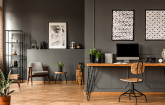
Steelcase Forecast: Walls Are The Next Technology Device
Company Unveils Vertical Intelligent Architecture to Create Smart Rooms for Augmented Group and Individual Innovation
CHICAGO, June 10, 2013 /PRNewswire/ -- The newest technological device may be one of the oldest architectural elements – the wall. Steelcase today launches V.I.A.™, vertical intelligent architecture, designed to create spaces that help fuel the innovation process. V.I.A. hosts the latest large-scale video and display technologies, offers unprecedented acoustic privacy, and easily reconfigures to support rapid change. It is being shown for the first time at NeoCon 2013 in Chicago June 10-12.
To view the multimedia assets associated with this release, please click: http://www.multivu.com/mnr/62072-steelcase-v-i-a-vertical-intelligent-architecture-walls
(Photo: http://photos.prnewswire.com/prnh/20130610/MM29259)
"Walls are the most underutilized real estate in commercial environments today," states Allan Smith, vice president of marketing for Steelcase. "Walls are not 'smart' and they're rarely very private. We created the V.I.A. architectural solution to host the latest large-scale technologies and create smart rooms where people can concentrate and get creative, whether they're working in a group or individually."
Steelcase consolidated over 15 years of research on innovation and identified several key tensions in the workplace that need to be resolved:
- Innovation requires focus – both at a group and individual level, but distractions undermine innovation. While 95% of workers say it's important to have access to quiet places for concentrated work, according to Steelcase data, a recent Steelcase/Harris Interactive survey revealed 50 percent of office workers feel their work spaces do not prevent noisy distractions.
- The more mobility workers gain because of their devices, the more they need fixed places where they can connect and collaborate. The most important attributes people want in these fixed spaces are: acoustical privacy (56%), easy-to-use videoconferencing (47%), whiteboards (43%) and multiple display screens (40%).
- The smaller technology devices become, the more people need large-scale displays to share and communicate effectively with others. In fact, 39 percent of workers say it is very important that collaboration spaces allow them to share content from their mobile devices.
- The more data organizations generate, the more people need places to help them make sense of it. But 35 percent of people say they struggle with visualizing data while working on tough problems.
Steelcase sees a shift toward three primary types of workplace technologies: smartphones, tablets and large-scale architectural displays. "Architecture and technology will become the same thing," notes Brett Kincaid, director of design for the V.I.A. architectural solution. "Technology-enabled architecture will be required to support smart rooms that create the optimal conditions for collaboration and innovation among teams that are globally distributed, as well as locally based." Visitors at NeoCon will enter rooms created with V.I.A. that are enabled with sensors, activators and microprocessors that will augment the interactions of people within the space by taking on tasks such as adjusting lighting, signaling noise levels, turning on screens and capturing information.
In the future, walls will not just define private offices but will define "private experiences" such as video conversations, brainstorming new concepts, and confidential conversations. V.I.A. creates a new benchmark around true acoustical privacy and is engineered with full silencing seals to contain noise disturbance from active team work. Conversely, people crave spaces where they can work individually, stay focused and have a private conversation freely. In fact, 65% of workers said they feel self-conscious about being overheard during conversations they intended to be private, according to the Steelcase/Harris study. Additionally, "unwanted sound" is well documented as physically exhausting with negative impacts on health and wellbeing. The V.I.A. architectural solution can create individual or team spaces that virtually eliminate noise disruptions and offer enhanced private experiences.
Created by the Steelcase Design Studio in collaboration with Claudio Bellini, V.I.A. anticipates future needs and can accept new technologies as they evolve.
"Innovation is hard work, and people need smart rooms, enabled with technology and enhanced acoustical privacy where they can collaborate on a vertical surface or focus on their own," notes Kincaid. "As real estate becomes more limited, walls need to work harder. Today they are an underutilized asset. Tomorrow walls will become the next technology device and the new work surface."
About Steelcase
For more than 100 years, Steelcase Inc. has helped create great experiences for the world's leading organizations – wherever work happens. Steelcase and our family of brands – including Steelcase®, Coalesse®, Designtex®, Details®, Nurture®, PolyVision® and Turnstone® – offer a comprehensive portfolio of furnishings, products and services designed to unlock human promise and support social, economic and environmental sustainability. We are globally accessible through a network of channels, including approximately 650 dealers. Steelcase is a global, industry-leading and publicly traded company with fiscal 2013 revenue of $2.9 billion.
SOURCE Steelcase





Share this article